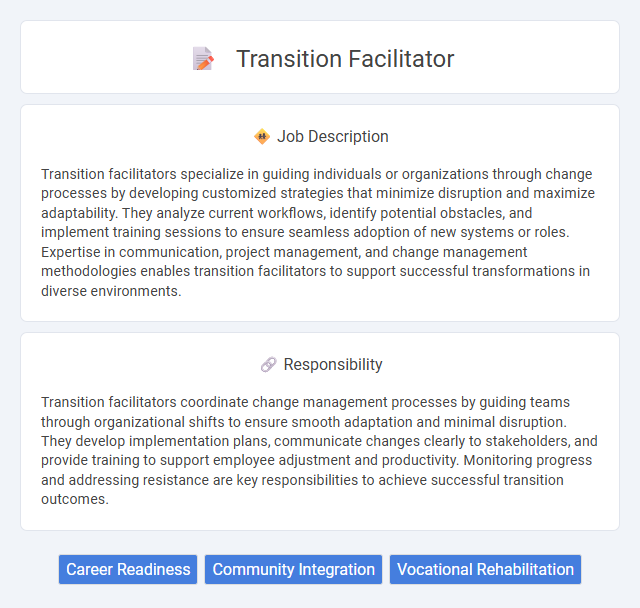
Transition facilitators specialize in guiding individuals or organizations through change processes by developing customized strategies that minimize disruption and maximize adaptability. They analyze current workflows, identify potential obstacles, and implement training sessions to ensure seamless adoption of new systems or roles. Expertise in communication, project management, and change management methodologies enables transition facilitators to support successful transformations in diverse environments.
Individuals experiencing significant life changes or facing challenges in adapting to new environments may likely find the role of a transition facilitator suitable due to their empathy and strong communication skills. Those who possess patience, problem-solving abilities, and a natural inclination to support others through uncertainty probably have a higher chance of thriving in this position. Conversely, people who struggle with emotional resilience or lack interpersonal skills might face difficulties excelling as transition facilitators.
Qualification
A Transition Facilitator requires strong project management skills, expertise in change management methodologies, and excellent communication abilities to guide organizations through complex transitions. Proficiency in stakeholder engagement, risk assessment, and training coordination ensures smooth adoption of new systems or processes. Relevant certifications such as Prosci, PMP, or change management credentials enhance a candidate's qualifications for this role.
Responsibility
Transition facilitators coordinate change management processes by guiding teams through organizational shifts to ensure smooth adaptation and minimal disruption. They develop implementation plans, communicate changes clearly to stakeholders, and provide training to support employee adjustment and productivity. Monitoring progress and addressing resistance are key responsibilities to achieve successful transition outcomes.
Benefit
Transition facilitators likely enhance organizational change by improving communication and reducing employee resistance. Their presence may increase the probability of smoother workflow adjustments and faster adaptation periods. Organizations that utilize transition facilitators could experience higher employee satisfaction and increased retention rates during periods of change.
Challenge
Transition facilitator roles likely involve managing complex change processes within organizations, which can present significant challenges due to resistance from employees and the need to align diverse stakeholder interests. Navigating ambiguous situations and maintaining momentum during periods of uncertainty may frequently require advanced problem-solving and interpersonal skills. The probability of encountering unexpected obstacles suggests that adaptability and strategic communication are essential for success in this position.
Career Advancement
Transition facilitators play a crucial role in career advancement by guiding individuals through skill development and job placement during significant career changes. They utilize personalized coaching, labor market analysis, and networking strategies to align clients' qualifications with emerging industry demands, enhancing employability. Expertise in change management and workforce trends enables transition facilitators to accelerate career growth and long-term professional success.
Key Terms
Career Readiness
Transition facilitators play a critical role in enhancing career readiness by guiding students and job seekers through skill development, goal setting, and workplace integration strategies. They assess individual strengths and challenges, connecting clients with relevant resources such as vocational training, internships, and mentoring programs. Their support ensures smoother transitions from education to employment, fostering long-term career success and adaptability in evolving job markets.
Community Integration
Transition facilitators play a crucial role in community integration by supporting individuals as they move from institutional settings to independent living environments. They collaborate with local agencies, healthcare providers, and social services to create personalized plans that ensure seamless access to housing, employment, and social supports. Their expertise in coordinating resources enhances social inclusion and promotes sustainable community participation for diverse populations.
Vocational Rehabilitation
Transition facilitators in vocational rehabilitation specialize in guiding individuals with disabilities or barriers to employment through tailored career planning and skill development services. They coordinate assessments, individualized support, and resource connections to promote successful employment outcomes and independent living. Expertise in labor market trends, assistive technologies, and disability rights legislation enhances their ability to create effective transition plans aligned with client needs and vocational goals.
 kuljobs.com
kuljobs.com